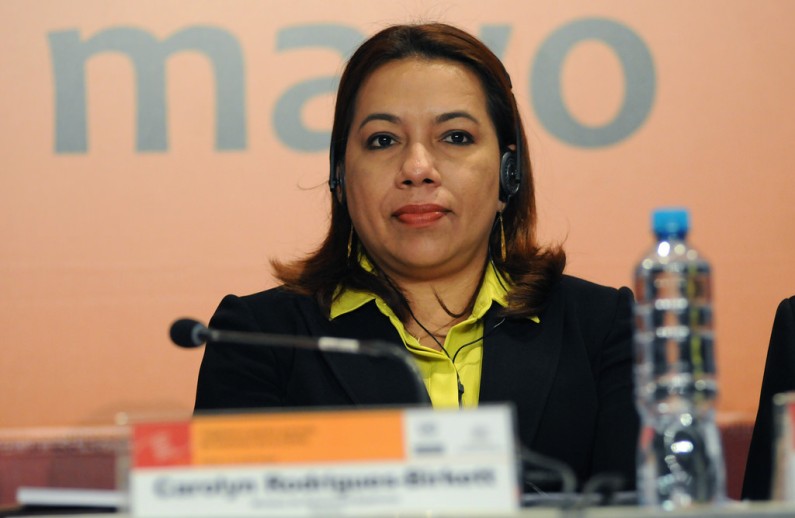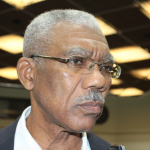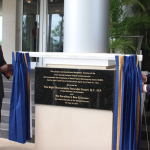
The post-2015 development agenda must address the urgent challenges of poverty and inequality and build on the successes and shortcomings of the Millennium Development Goals (MDGs), with measurable targets and scaled-up investments in areas such as education, health, gender equality and youth employment, the Economic and Social Council heard during high-level meetings.
Guyana’s Minister of Foreign Affairs Carolyn Rodrigues-Birkett attended the Economic and Social Council of the United Nations Ministerial Meeting (ECOSOC) of the High Level Political Forum on Sustainable Development at UN Headquarters on July 7, 2014. She addressed the forum on behalf of the Caribbean Community (CARICOM) where the speakers pinned their hopes on the Post- 2015 Development Agenda as the means to address obstacles to progress.
With 50 delegations participating in the general debate, Minister Rodrigues-Birkett, said that the new agenda should contain ambitious action to combat climate change and unsustainable patterns of consumption and production, and help to shift the world economy to a low-carbon trajectory.
She stated that CARICOM countries had made determined efforts to achieve the Millennium Development Goals and were on course to achieve most of them. The Minister pointed particularly to education, health, gender, and hunger and poverty eradication. The post-2015 development agenda requires ambitious action to combat climate change and unsustainable patterns of consumption and production.
The Minister also highlighted five aspects in keeping with the Annual Ministerial Review. Firstly, on Addressing Persistent Challenges and the Unfinished Agenda, she noted that the MDGs have facilitated significant successes in several areas, in some instances exceeding expectations. However, these successes often mask an uneven profile of achievement and a core of persistent challenges, including pronounced inequalities, poverty, health, gender and systemic issues. These represent the unfinished agenda of the MDGs that must be carried forward.
Minister Rodrigues-Birkett pointed out that a challenge of increasing concern to CARICOM is the situation of young people which requires an urgent, coherent and effective global response. CARICOM Heads of Government have agreed to give renewed priority to this issue with its outreach to young people through the Youth Forum which is well placed to contribute to the global response.
The second issue highlighted was Facilitating a Strong Final Push and Smooth Transition. Pointing out that that a credible strong final push on the MDGs is imperative, she added that a strong finish will also help to generate momentum for the new agenda.
Thirdly, Minister Rodrigues-Birkett focused on The Important Role of Measurement and the Use of Data. This she stated would focus on making greater use of the potential of big data in planning for sustainable development.
“In CARICOM, we face fundamental challenges in the quality, timeliness and relevance of data. For us, there needs to be a data revolution that embraces greater availability and utilization of appropriate data in our planning,” the Minister pointed out.
She explained that greater utilisation of the data generated in CARICOM by the UN and other development partners would enable CARICOM countries access much needed concessional resources for development.
The fourth highlight of Provision of Means of Implementation calls for more resources to effectively implement the expanded and more comprehensive post-2015 agenda. “CARICOM calls for a more mature dialogue among all relevant stakeholders to ensure that the necessary means of implementation are provided at all levels, to facilitate greater coherence of effort and effectiveness of outcomes and to sustain development gains, including best practices, templates and models that would be viable for countries in different situations and stages of development. For this reason, we believe that the discussion on means of implementation, including financing, must remain an important part of the substantive discussions,” the Minister stated.
The final issue highlighted was on Enhancing Monitoring and Accountability. This focused on reducing the implementation deficit with respect to sustainable development and promoting the accountability of all actors.
The situation of youth requires attention and had been made a priority by CARICOM Heads of States. Greater use of regional data by the UN and other development partners was needed, as were better measures of development than gross domestic product (GDP) per capita, which gave a somewhat distorted picture of development in small countries by failing to take due account of their specific vulnerabilities. The forum must bring new vitality to the United Nations system’s institutional infrastructure for sustainable development by promoting synergies across intergovernmental bodies and processes, including effective follow-up to the Barbados Programme of Action and to the outcome of the upcoming Third International Conference on Small Island Developing States.
UN Secretary-General Ban Ki-moon released the MDG Report 2014, describing it as “the most-to-date global scorecard”.
Many key targets had been met or were within reach, but achievements had been uneven, among and within regions and countries, and between population groups. He would produce a “synthesis” report in September 2015 to support Member States in their negotiations.
Eradicating extreme poverty was a defining challenge and even more clearly an imperative to building stable societies and tackling growing inequality, in rich and poor countries alike.











You must be logged in to post a comment Login